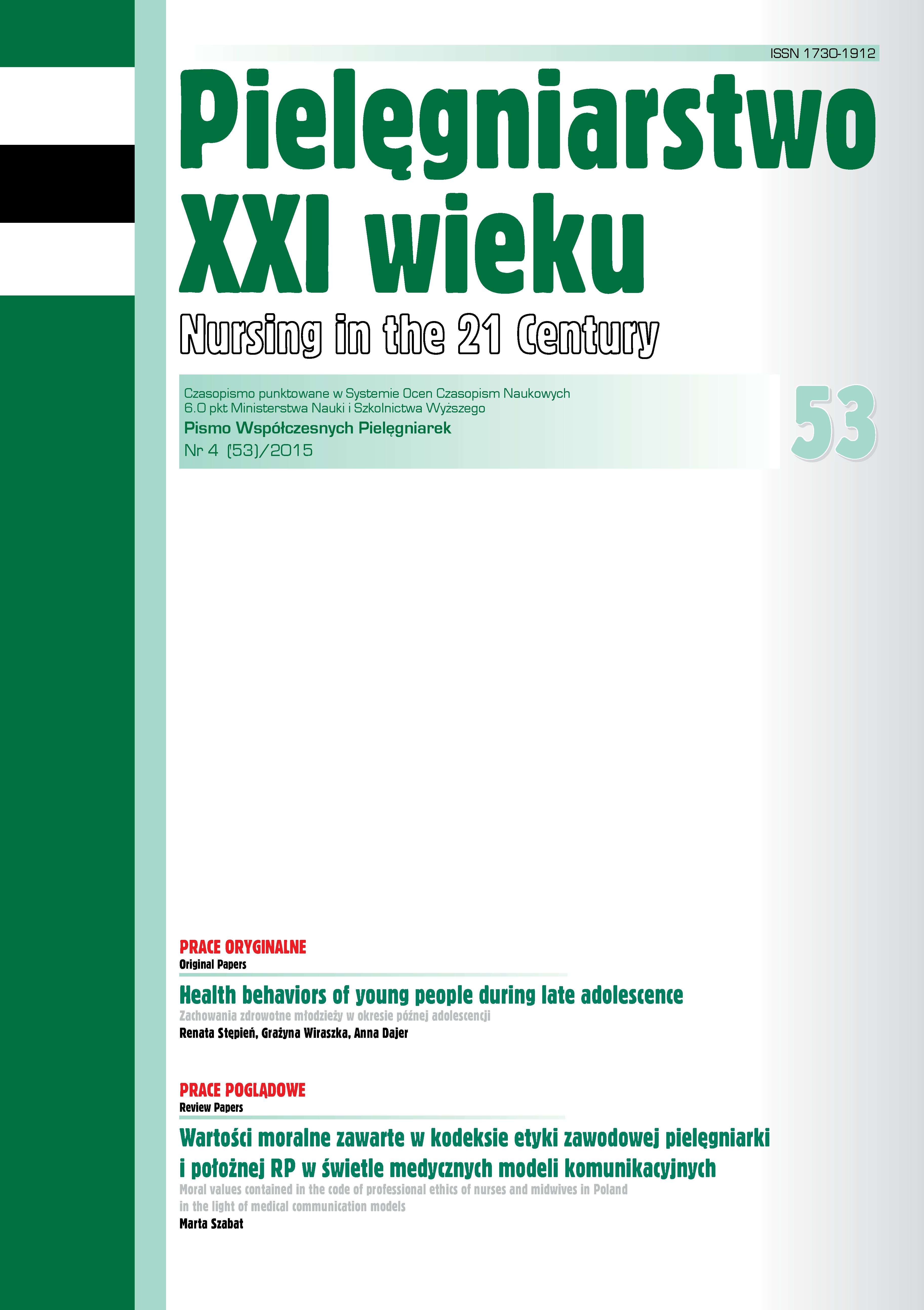Assessment of Satisfaction with the Quality of Conventional Treatment in Patients with Diagnosed Civilisation Diseases in the Contex of Professional Nurse Competences
DOI:
https://doi.org/10.12923/p21w-2015-4/51Keywords:
quality of conventional care, competences, nurse, patient, satisfactionAbstract
ASSESSMENT OF SATISFACTION WITH THE QUALITY OF CONVENTIONAL TREATMENT IN PATIENTS WITH DIAGNOSED CIVILISATION DISEASES IN THE CONTEX OF PROFESSIONAL NURSE COMPETENCES
Introduction. Satisfaction with the quality of conventional treatment, including nursing care, in the opinion of patients directly translates into levels of satisfaction, whose quantifiable indicators provide information on quality within the healthcare system. Medical team is required to perform their professional duties with best possible results, which becomes particularly meaningful with respect to patients who suffer from cardiovascular diseases, as they have become an increasingly pressing health issue among the senior population.
Aim. Assessment of competences and evaluation of quality of conventional care among the patients treated for cardiovascular diseases.
Material and methods. Research covered a group of 100 patients hospitalized due to ischemic heart disease and arterial hypertension. Author`s questionnaire was used as research tool with the support of anonymous Questionnaire of Patient Satisfaction (QPS).
Results. The patients taking part in the evaluation and assessing the level of medical care as high accounted for 74%. A significant group (77%) expressed satisfaction with treatment or care procedures they underwent. Similarly, a large group of participants (76%) underlined the fact of receiving the information related to their functioning with the disease. Just as highly patients evaluated the level of cooperation (66%) with the medical team and their promptness in bringing help (60%). A statistically significant correlation between the age of the patients and the level of satisfaction with medical care was noted.
Conclusion. In the opinion of evaluated patients, the general assessment of the quality of care was highly positive. Men and persons from the age group of 66-85 gave a higher assessment of quality of performed medical services. General nursing competences in the educational scope were assessed as being average. Patients with higher education and persons from the age group of 26-45 years of age were harsher critics, more demanding with respect to nurses’ competences.
References
1. Piątek A. Zarządzanie jakością. [w]: Ksykiewicz-Dorota A. red. Zarządzanie w pielęgniarstwie. Lublin: Czelej; 2005: 303-329.
2. Ustawa z dnia 5 lipca 1996r. o zawodach pielęgniarki i położnej (tekst jedn. Dz U z 2001 r., nr 57, poz.602 z późn.zm).
3. Garczyk D. Jakość i ocena opieki pielęgniarskiej. Neuroskop. 2012; 14: 72-78.
4. Glińska J, Bednarska A, Brosowska B, i wsp. Analiza poziomu jakości opieki pielęgniarskiej w opinii pielęgniarek i pacjentów. Pielęgniarstwo Chirurgiczne i Angiologiczne. 2012; 4: 151-160.
5. Wykrzykowska M. Ocena opieki pielęgniarskiej w opinii pacjentów. Pielęgniarstwo Chirurgiczne i Angiologiczne. 2007; 1: 3-10.
6. Juszczak K. Czynniki wpływające na zadowolenie pacjenta z opieki pielęgniarskiej w świetle badań. Pielęgniarstwo Chirurgiczne i Angiologiczne. 2013; 4: 115-117.
7. Gaweł G, Twarduś K, Kin-Dąbrowska J, i wsp. Jakość opieki pielęgniarskiej na oddziale kardiologicznym. Problemy Pielęgniarstwa. 2008; 16: 339-342.
8. Laschinger HS, Hall LM, Pederson C, et al. A psychometric analysis of the patient satisfaction with nursing care quality questionnaire: an actionable approach to measuring patient satisfaction. J Nurs Care Qual. 2005; 20: 220-230.
9. Grabska K, Stefańska W. Sylwetka zawodowa pielęgniarki w opinii pacjentów. Problemy Pielęgniarstwa. 2009; 17 (1): 8-12.
10. Gniadek A, Malinowska-Lipień I, Zaniewska M, et al. Wybrane aspekty satysfakcji pacjentów z pobytu w oddziałach chorób wewnętrznych szpitala w Krakowie. Pielęgniarstwo XXI wieku. 2012; 4(41): 17-21.
11. Grochans E, Seewald K, Szkup-Jabłońska M. et al. Satysfakcja z opieki pielęgniarskiej pacjentów pielęgnowanych tradycyjnie oraz w systemie Primary Nursing. Problemy Pielęgniarstwa. 2011; 19(2): 177-184.
12. Brodzińska M, Modzelewska K, Stachowska M, i wsp. Stratyfikacja czynników determinujących opinię o jakości świadczeń w zakresie kompetencji pielęgniarki podstawowej opieki zdrowotnej. Doniesienia wstępne. Problemy Higieny i Epidemiologii. 2010; 91(2): 303-307.
13. Piątek A. Doskonalenie jakości opieki pielęgniarskiej. [w:] Ksykiewicz-Dorota A. red. Podstawy organizacji pracy pielęgniarki. Lublin: Czelej; 2004: 161-179.
14. Kózka M, Majda A, Kula A. Ocena jakości życia i zachowań zdrowotnych pacjentów ze stabilną chorobą wieńcową w wieku geriatrycznym. Problemy Pielęgniarstwa. 2013; 21(4): 433-442.
15. Pabiś M, Ślusarska B, Jarosz MJ, et al. Kompetencje pielęgniarek w zakresie edukacji zdrowotnej w polskim systemie opieki zdrowotnej. Pielęgniarstwo XXI wieku. 2010; 3-4 (32-33): 75-85.
16. Ogórek-Tęcza B, Ratoń A, Kamińska A, et al. Poczucie sensu życia u osób chorych przewlekle. Pielęgniarstwo XXI wieku. 2012; 4 (41): 41-45.
Downloads
Published
Issue
Section
License
Copyright (c) 2015 Beata Ogórek-Tęcza, Natalia Zachara (Autor)

This work is licensed under a Creative Commons Attribution 4.0 International License.




